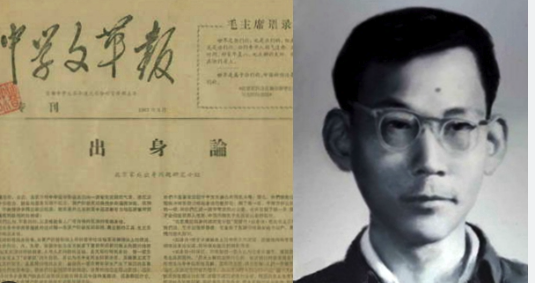Yu Luoke (1942-1970) was a worker and writer. His parents were both labeled Rightists during the 1957 Anti-Rightist Campaign, which made him a child of one of the "Five Black Categories," which formed what was essentially a permanent underclass in Mao's China (the others were landlords, rich farmers, counter-revolutionaries, and bad elements). For Yu, that meant he was not admitted to the university even though he scored well in the college entrance exams several times. Instead, he worked as a farmer, a substitute teacher and other part-time jobs before being assigned to the Beijing People's Machine Factory as an apprentice. After the Cultural Revolution began, in July 1966, Yu Luoke wrote an article entitled "The Theory of Origin" to refute the then-dominant theory that held that family origin determines the development of an individual. Yu argued that origin has very little influence on the performance of an individual, and criticized the persecution of young people from “bad” families, pointing out that this was a serious violation of human rights. The article was later published in January 1967 in the first issue of the Middle School Cultural Revolution Newspaper, which was founded by his brother Yu Luowen, and scholar Mou Zhijing. Yu Luoke later published several articles on the issue of origin in the newspaper under the pseudonym "Study Group on Family Origin." The newspaper was widely distributed and had a great impact. The article was later labeled "a great poisonous weed." On January 5, 1968, Yu Luoke was arrested, and on March 5, 1970, he was sentenced to death at the Workers' Stadium in Beijing, at the age of 27, and was immediately executed. On November 21, 1979, the Beijing Intermediate People's Court acquitted him.
To commemorate him, his friends and family, as well as Chinese and foreign scholars and human rights activists, erected a statue of him in 2009 at the Songzhuang Art Gallery in Tongzhou, Beijing, which was later dismantled after more and more people were visiting the statute to pay their respects with flowers. Other activities to commemorate him have also often been obstructed by the authorities.
To commemorate him, his friends and family, as well as Chinese and foreign scholars and human rights activists, erected a statue of him in 2009 at the Songzhuang Art Gallery in Tongzhou, Beijing, which was later dismantled after more and more people were visiting the statute to pay their respects with flowers. Other activities to commemorate him have also often been obstructed by the authorities.
Items by this creator
Article
